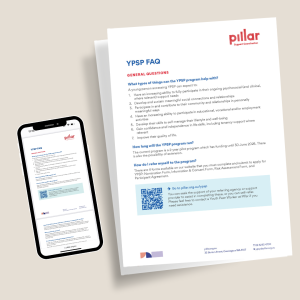Frequently asked questions for YPSP
Please see the Pillar YPSP frequently asked questions below. If you wish to find out more, please contact us on (08) 6325 4500 or ypsp@pillar.org.au. You can submit a question using the form on this page.
Download the Pillar YPSP FAQ.pdf here.
General questions
What types of things can the YPSP program help with?
A young person accessing YPSP can expect to:
- Have an increasing ability to fully participate in their ongoing psychosocial (and clinical, where relevant) support needs
- Develop and sustain meaningful social connections and relationships
- Participate in and contribute to their community and relationships in personally meaningful ways
- Have an increasing ability to participate in educational, vocational and/or employment activities
- Develop their skills to self-manage their lifestyle and well-being
- Gain confidence and independence in life skills, including tenancy support where relevant
- Improve their quality of life.
How long will the YPSP program run?
The current program is a 2-year pilot program which has funding until 30 June 2025. There is also the possibility of extension.
Will there be services available in Mandurah?
Yes, the program is available for young people living in the Perth metropolitan and Peel areas, or those intending to move to the Perth metro area soon.
How do I refer myself to the program?
There are 4 forms available on our website that you must complete and submit to apply for YPSP: Nomination Form, Information & Consent Form, Risk Assessment Form, and Participant Agreement.
Go to https://pillar.org.au/ypsp/
You can seek the support of your referring agency or support provider to assist in completing these, or you can self-refer. Please feel free to contact a Youth Peer Worker at Pillar if you need assistance.
How long will the process take from nomination, to assessment, to offer?
There is no set timeframe, as it depends on the timing of referrals, the quality of the information and the frequency of panel sessions. We’re trying to make the nomination process as easy and quick as possible, allowing the young person more time to engage with services.
Who provides the services?
Anglicare WA and Mind Australia are the YPSP service providers. Young people who are accepted into the program can meet with one or both providers – it’s up to them. This allows young people to choose their provider after discussing the services they offer and how they work.
How long does a package/funding period last for?
It varies. The chosen service provider – either Mind Australia or Anglicare WA – will meet with the young person to develop an individualised plan of supports that reflects their goals and recovery plan.
The length of the package will vary for each person depending on their goals and outcomes. The plans will be reviewed on a regular basis to monitor progress and make any required adjustments.
If there is high demand for YPSP, will it expand?
The YPSP is currently a pilot program which is funded for 2-years until 30 June 2025 (with the possibility of extension). This means that there are a limited number of packages available, and services can only be provided within the current timeframe. If the program is extended or funded longer-term, it may be expanded.
Assessment
Is it necessary for a young person to attend the assessment panel?
Yes. Taking part in a panel meeting is an essential part of the assessment process. It helps the panel learn more about the young person and be able to allocate packages in a fair and equitable way.
The panel session is designed as an informal ‘meet and greet’ conversation with a panel of 3 people – a clinical nurse, a mental health service provider and a Pillar representative.
What if a young person feels anxious to go before the panel?
We’ll support them as much as possible. Young people can have a support person attend the meeting with them, such as a friend, family member or referring provider. They can also ask a Pillar Youth Peer Worker or cultural advisor to attend, if available.
Will there be outreach support/outreach on the panel?
Not at this stage. However, an outreach worker may be able to attend as support for the young person.
Youth Peer Workers
What is the role of Pillar’s Youth Peer Workers?
Pillar has two Youth Peer Workers who are available to support young people throughout the referral process. Youth Peer Workers can answer questions about the program, provide advice on eligibility and suitability, and generally support young people to make the right decisions for them.
Can young people seek support from a Peer Worker before they complete an application?
Yes, if they wish. Pillar’s Youth Peer Workers are available to assist young people with the application and help them explore if the program is right for them.
Eligibility
What are the criteria for eligibility?
To be considered for YPSP, young people will need to be:
- Living with moderate/severe mental health issues
- 16 to 24 years old
- An Australian citizen or permanent resident
- Living in Perth metro area (or planning to live in Perth metro soon)
- Willing to agree to fully participate in recovery-oriented support
- Able to provide informed consent or have a formally appointed Guardian agree to share information and participate in all aspects of the program
- Ready and voluntarily want to commit to engage in support
- Agree to participate in mental health assessments to confirm eligibility and identify the level of support needed.
How would you define moderate Mental Health issues? What would that look like?
A person with moderate mental health issues can live independently in the community but may require some lower-level support on a periodic or frequent basis. By comparison, a person with more complex mental health issues may require a high level of support on a frequent basis in order to live independently within the community.
Does the young person need to be active with mental health services?
Most likely. To be considered for the program, the young person must be willing to engage with services that support their goals and recovery. If mental health services were considered to be in their best interest, they would need to engage with these services. However, in some instances mental health services may not be required for a young person’s recovery journey.
Will you consider a person currently in hospital?
This needs to be discussed on a case-by-case basis. Generally, if the hospital admission is a short stay or the young person is nearing discharge, they could be considered for the program.
If a person on the program comes into the hospital, would they need to leave the program? Can it be put on hold?
This would be considered on a case-by-case basis, depending on the purpose of the visit and the length of stay.
Would you consider 15-year-old people turning 16 soon?
No. The person needs to be aged between 16-24 to be eligible. In this instance, the person would need to wait until their 16th birthday to be considered.
Can a person be supported if they are actively receiving support from a government funded program?
This would depend on the funded supports being received and whether they would be considered a duplication of funded services.
Do people from more socially disadvantaged/marginalised backgrounds get priority?
Yes. The focus of the program means that people experiencing social disadvantage or marginalisation are expected to be over-represented when compared with other population groups.
Priority population groups include young people who:
- Are Aboriginal / First Nations
- Are from Culturally and Linguistically Diverse (CaLD) backgrounds
- Identify as being part of the LGBTQIA+ community
- Are in care or are leaving care
- Have co-occurring mental health and AOD issues
- Have co-occurring disability (including those with cognitive and neurodevelopmental disability).
If a young person is suffering anxiety during their transition from school into tertiary education/employment, would they be eligible?
Eligibility will be considered on a case-by-case basis depending on the information provided. You should include as much information as possible in the nomination form to describe how mental health impacts on daily life.
Still have a question you want answered? Submit a question using the form at the top of this page!


